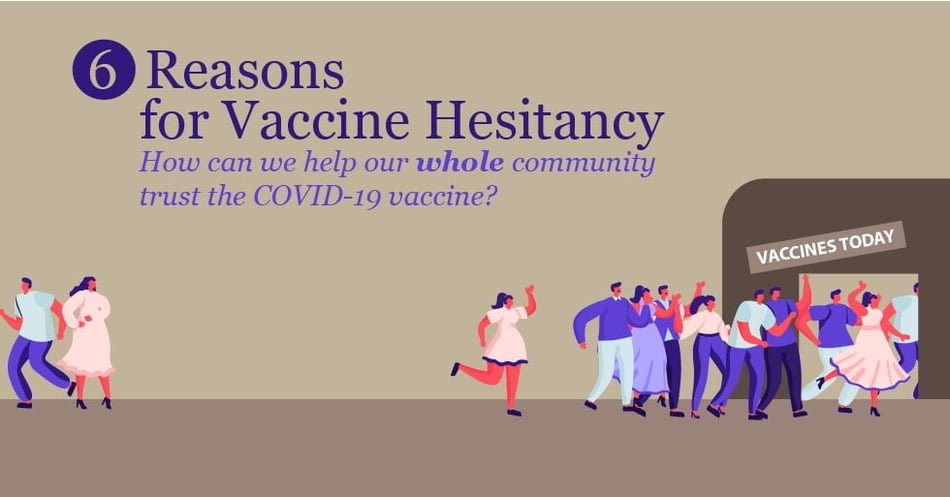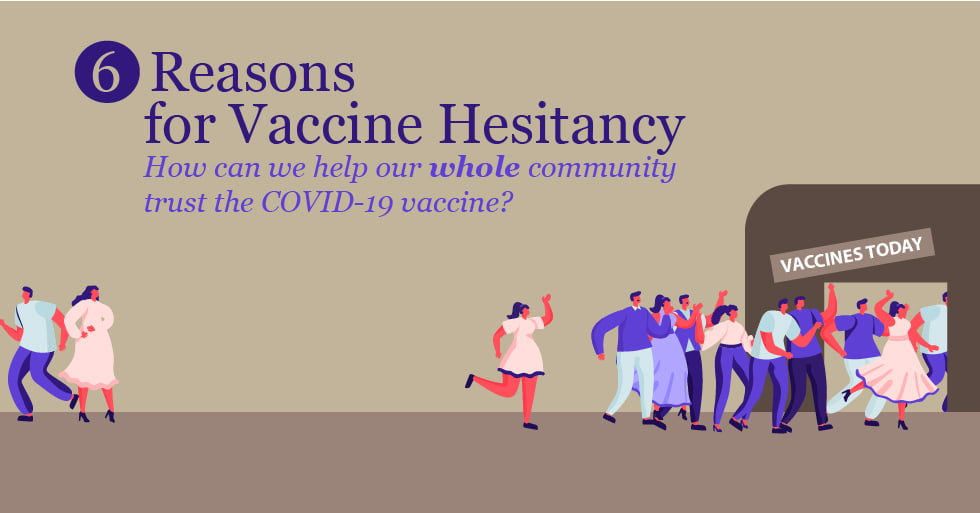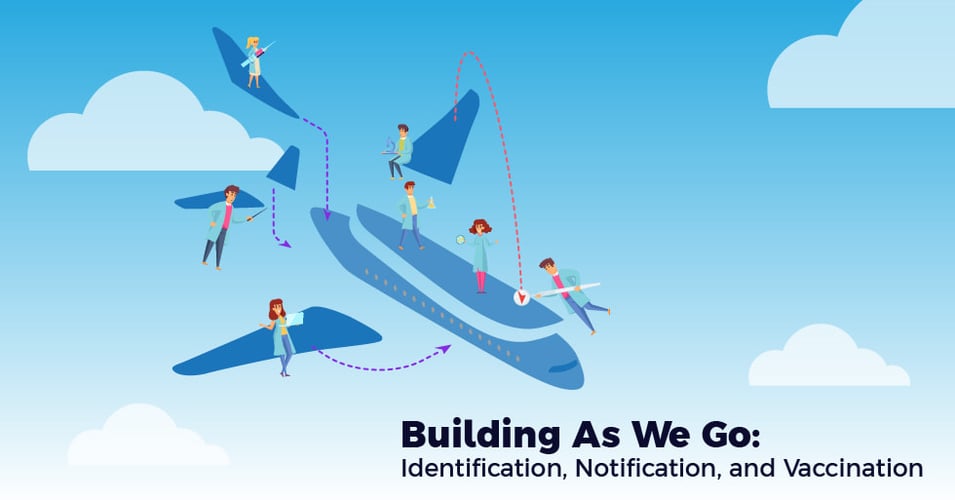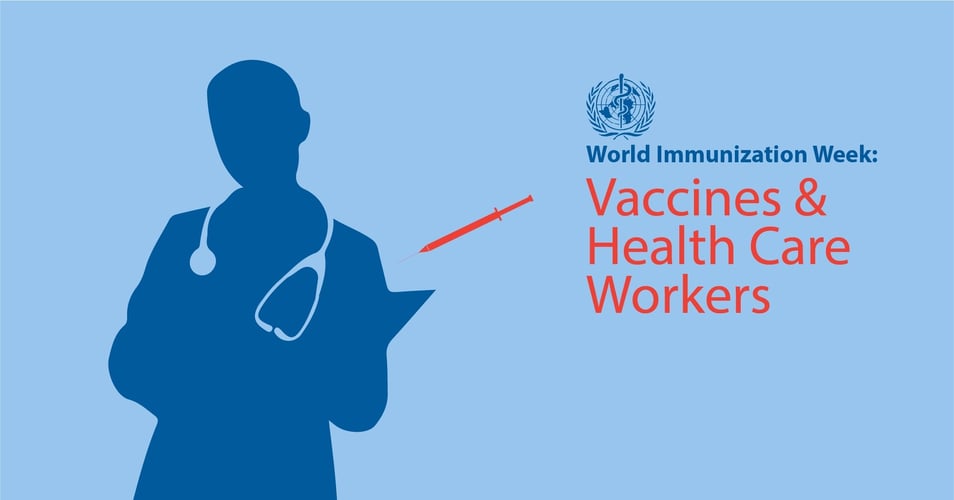6 Reasons for Vaccine Hesitancy

 After the hurdle of creating and distributing a vaccine for SARS-CoV-2, the next greatest challenge is ensuring that at least 80-85% of the population receives the vaccine. This number, which ensures herd immunity that will stop the spread of the pandemic, seems like an impossible goal when recent surveys show that up to 50% of the population doesn't want to get the vaccine in the first place. In order to help get enough people vaccinated, we have to understand the reasons for vaccine hesitancy and provide information to assuage concerns. Today we will look at 6 of the most common reasons folks are reluctant to get a vaccine for COVID-19.
After the hurdle of creating and distributing a vaccine for SARS-CoV-2, the next greatest challenge is ensuring that at least 80-85% of the population receives the vaccine. This number, which ensures herd immunity that will stop the spread of the pandemic, seems like an impossible goal when recent surveys show that up to 50% of the population doesn't want to get the vaccine in the first place. In order to help get enough people vaccinated, we have to understand the reasons for vaccine hesitancy and provide information to assuage concerns. Today we will look at 6 of the most common reasons folks are reluctant to get a vaccine for COVID-19.
Vaccine hesitancy is understandable, let's start there. It can be a real leap of faith for an individual to receive an injection when they are not sick. Let's look at some of the reasons folks are reluctant, so that we can all try to communicate effectively and respectfully.
#1: "It was developed too fast. There's no way it's safe."
This reason is very common. People are used to vaccines taking years or even decades to be approved, and this one is ready in less than a year? If someone is having a hard time trusting a vaccine that was developed so quickly, one approach is to let them know that billions upon billions of dollars were poured into finding this vaccine, something that no other vaccine benefits from. (We could find vaccines for many illnesses with the sheer financial and commercial support that was thrown behind this vaccine.) Despite the speed of the development, the vaccine still went through all the required trials, ensuring its safety.
#2: "It's too new of a vaccine type. I don't like that it uses DNA."
It makes a lot of sense that someone might have questions once they hear that this vaccine, unlike all others they know about, injects mRNA which directs our cells to produce the spike protein. They may worry that this changes their DNA, and permanently. These individuals may be reassured by learning more about the vaccine through some very good videos and online resources.
#3: "I just don't like any vaccines - any vaccines."
An individual with already deep-set beliefs about vaccines will naturally carry those beliefs over to the COVID-19 vaccine. Some individuals with this approach believe that getting the illness itself is safer than a vaccine, since it is more "natural." There are many ways to think about approaching a person with these beliefs, many of which are covered in this excellent article.
#4: "COVID-19 is just not a big deal. The vaccine is more risky than the virus."
Some folks still believe that COVID-19 is simply a "bad cold" or "flu." They may not know anyone personally who has had COVID-19, or they believe only the very old or infirm are badly affected. While statistics may demonstrate the relative risk of COVID-19 vs the vaccine, there may be more deep-seated beliefs about trust in information and federal agencies that may hinder progress in this area.
#5: "There are so many issues in healthcare that have not served my community. Why should I jump to get this vaccine when we need basic, affordable, respectful healthcare?"
Many minority communities have faced healthcare crises over the decades with little or no federal intervention. Access to affordable, quality healthcare, respectful treatment from medical professionals, and financial investment in conditions affecting minority groups have been seriously lacking. Going into these communities to push a vaccine and expect immediate acceptance does not take into consideration that many of these groups have been fighting for healthcare and feel like no one has listened. Taking steps to address those fundamental disparities in healthcare must be made before expecting these communities to embrace vaccination without hesitation.
#6: "Look, if it's my time to get sick, it's my time. It's fate. I'll just roll the dice."
Some vaccine hesitancy may be connected to a feeling that things are out of our hands. That what will come, will come, so we should just relax and see what life brings us. Demonstrating that vaccines are not a fearful reaction, but rather a proactive choice might make a difference for individuals with this mindset. There are choices we make each day that help keep us safe and yet still allow us to relax and not be driven by fear: We wear seatbelts. We try to make good food choices and stay active. We brush our teeth. We take vitamins. All these choices keep us on a path that makes us less vulnerable to harm that might come our way. (And that's when we can truly relax.)
Unfortunately, much vaccine hesitancy is fueled by misinformation spread by social media networks. Fears and suspicious spread like wildfire, making the task of convincing an individual who is hesitant to trust a vaccine even more difficult. Chances are, we have all encountered vaccine hesitancy in some form or other in our lives; maybe we've even struggled with it ourselves. We have to start from a position of understanding and respect for a person's beliefs, as well as understand that we live in an era where misinformation can seem legitimate and credible at first glance. In order to help our whole community trust vaccines, we all have work to do to counteract that misinformation with facts and respect.
![EOScu Logo - Dark - Outlined [07182023]-01](https://blog.eoscu.com/hubfs/Eoscu_June2024/Images/EOScu%20Logo%20-%20Dark%20-%20Outlined%20%5B07182023%5D-01.svg)




